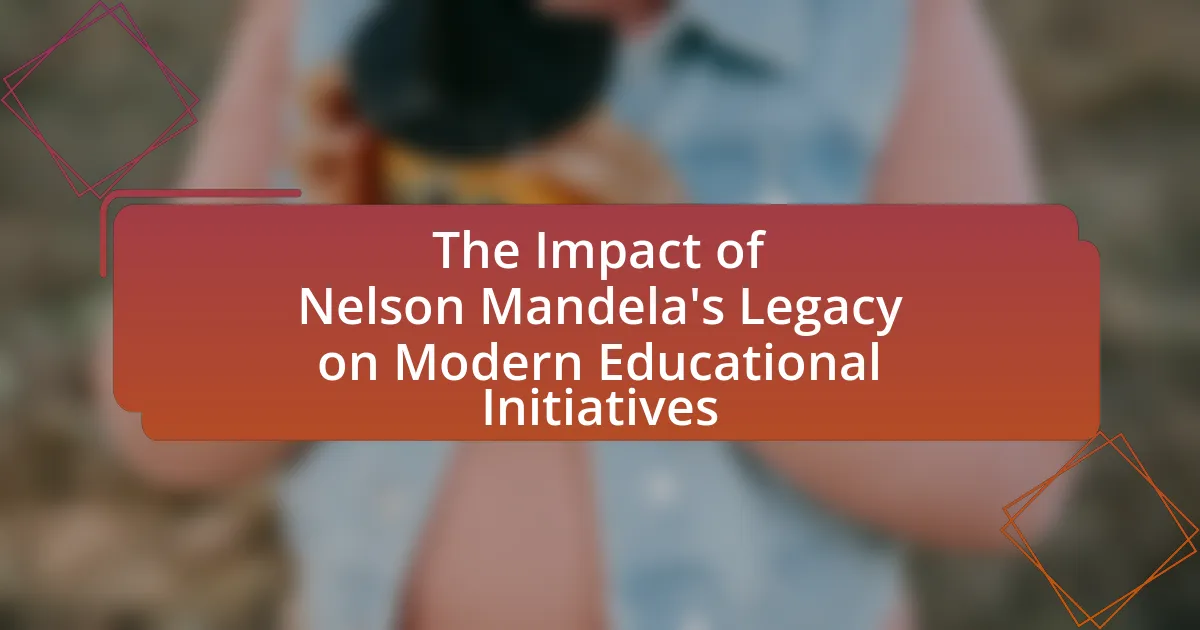The article focuses on the integration of Nelson Mandela’s values—such as equality, respect, forgiveness, and social justice—into school curriculums. It highlights the importance of these values in promoting inclusivity, critical thinking, and community engagement among students. The discussion includes how Mandela’s principles align with educational goals, the challenges faced in their implementation, and successful case studies demonstrating their positive impact on student development and school culture. Additionally, the article outlines practical steps and necessary curriculum changes to effectively incorporate these values, emphasizing the role of community involvement in enhancing the integration process.

What are Mandela’s Values and Why are They Important in Education?
Mandela’s values include equality, respect, forgiveness, and social justice, which are crucial in education as they promote inclusivity and critical thinking. These values encourage students to appreciate diversity and foster a sense of community, essential for a harmonious society. For instance, Mandela emphasized the importance of education in achieving social change, stating, “Education is the most powerful weapon which you can use to change the world.” This perspective underlines the role of education in empowering individuals to challenge injustices and contribute positively to society. Integrating these values into school curriculums cultivates responsible citizens who are equipped to address societal issues effectively.
How do Mandela’s Values align with educational goals?
Mandela’s values align with educational goals by emphasizing equality, respect, and social justice, which are fundamental principles in fostering inclusive learning environments. His commitment to education as a tool for empowerment is evident in his belief that “education is the most powerful weapon which you can use to change the world.” This perspective supports educational objectives aimed at developing critical thinking, promoting diversity, and encouraging civic responsibility among students. Furthermore, Mandela’s advocacy for access to quality education for all, regardless of background, reinforces the goal of creating equitable educational opportunities, thereby enhancing social cohesion and community development.
What specific values did Mandela promote that can be integrated into curriculums?
Nelson Mandela promoted values such as equality, respect for diversity, social justice, and reconciliation, which can be integrated into curriculums. These values are essential for fostering an inclusive educational environment that encourages students to appreciate different cultures and perspectives. For instance, Mandela’s emphasis on equality is evident in his fight against apartheid, advocating for equal rights for all South Africans, which can be taught through lessons on civil rights movements globally. Additionally, his commitment to reconciliation after years of conflict highlights the importance of forgiveness and understanding, which can be incorporated into conflict resolution education. These values not only reflect Mandela’s legacy but also align with global educational goals aimed at developing responsible and empathetic citizens.
How can these values enhance student development and character building?
Integrating Mandela’s values, such as respect, empathy, and social justice, enhances student development and character building by fostering a sense of responsibility and community engagement. These values encourage students to understand diverse perspectives, promoting inclusivity and collaboration. Research indicates that schools implementing character education programs based on these values report improved student behavior and academic performance, as seen in the study by Lickona and Davidson (2005) in “Smart & Good High Schools.” This demonstrates that instilling such values not only shapes ethical individuals but also cultivates a positive school culture, ultimately leading to well-rounded personal development.
Why is it essential to integrate Mandela’s Values into school curriculums?
Integrating Mandela’s values into school curriculums is essential because these values promote social justice, equality, and respect for human rights. Mandela’s commitment to education as a tool for empowerment underscores the importance of teaching students about tolerance, diversity, and the significance of standing against oppression. Research indicates that educational frameworks incorporating these values can lead to improved student engagement and a more inclusive school environment, fostering critical thinking and civic responsibility among young learners.
What impact can these values have on school culture and community?
Integrating Mandela’s values into school curriculums can significantly enhance school culture and community by fostering inclusivity, respect, and social responsibility. These values promote a sense of belonging among students, encouraging collaboration and reducing instances of bullying. Research indicates that schools emphasizing values such as empathy and equality experience improved student engagement and academic performance, as seen in the “Values in Education” study published by the University of Cape Town, which found that schools implementing character education programs reported a 20% increase in student attendance and a 15% decrease in disciplinary issues. Thus, the incorporation of Mandela’s values not only enriches the educational environment but also strengthens community ties, creating a more harmonious and supportive atmosphere for all stakeholders.
How do Mandela’s Values contribute to social justice and equality in education?
Mandela’s values significantly contribute to social justice and equality in education by promoting inclusivity, respect for diversity, and the right to education for all. His belief in the transformative power of education is evident in his assertion that “education is the most powerful weapon which you can use to change the world.” This perspective underlines the importance of equitable access to quality education, which is essential for dismantling systemic inequalities. Furthermore, Mandela’s emphasis on reconciliation and understanding fosters an educational environment where diverse backgrounds are acknowledged and respected, thereby enhancing social cohesion. His legacy inspires educational policies that aim to eliminate barriers to education, ensuring that marginalized communities receive the support necessary to thrive academically.

What are the Challenges of Integrating Mandela’s Values into School Curriculums?
Integrating Mandela’s values into school curriculums faces several challenges, including resistance from educators, lack of resources, and differing interpretations of his values. Educators may resist changes due to entrenched curricula or personal beliefs that conflict with Mandela’s principles of equality and social justice. Additionally, many schools lack the necessary resources, such as training materials and professional development opportunities, to effectively teach these values. Furthermore, interpretations of Mandela’s values can vary widely, leading to inconsistencies in how they are presented in different educational contexts. These challenges hinder the effective incorporation of Mandela’s ideals into educational frameworks.
What obstacles do educators face when implementing these values?
Educators face several obstacles when implementing Mandela’s values into school curriculums, primarily including resistance to change, lack of resources, and insufficient training. Resistance to change often stems from established educational practices and cultural norms that may not align with Mandela’s values, making it difficult for educators to introduce new concepts. Additionally, a lack of resources, such as funding for materials and programs that promote these values, hinders effective implementation. Insufficient training for educators on how to integrate these values into their teaching further complicates the process, as many may not feel equipped to convey the principles effectively. These challenges collectively impede the successful integration of Mandela’s values into educational settings.
How can resistance from stakeholders be addressed?
Resistance from stakeholders can be addressed through effective communication and engagement strategies. By actively involving stakeholders in the decision-making process, their concerns can be acknowledged and addressed, fostering a sense of ownership and collaboration. Research indicates that when stakeholders are engaged early and consistently, resistance decreases significantly, as seen in various educational reform initiatives. For instance, a study by the Harvard Business Review highlights that transparent communication and inclusive practices lead to higher stakeholder satisfaction and reduced opposition.
What resources are necessary to support this integration?
To support the integration of Mandela’s values into school curriculums, essential resources include educational materials, training programs for educators, and community engagement initiatives. Educational materials such as textbooks, lesson plans, and multimedia resources that highlight Mandela’s principles of equality, justice, and reconciliation are crucial for effective teaching. Training programs for educators ensure that teachers are well-equipped to convey these values and foster an inclusive classroom environment. Community engagement initiatives, including partnerships with local organizations and workshops for parents, enhance the relevance and impact of the curriculum by connecting it to the broader societal context. These resources collectively facilitate a comprehensive approach to embedding Mandela’s values in educational settings.
How can schools effectively overcome these challenges?
Schools can effectively overcome challenges in integrating Mandela’s values into curriculums by implementing comprehensive training programs for educators. These programs should focus on understanding Mandela’s principles, such as equality, respect, and social justice, enabling teachers to convey these values effectively in their lessons. Research indicates that professional development initiatives, like those outlined in the “Teaching for Change” report by the National Education Association, significantly enhance educators’ ability to incorporate social justice themes into their teaching. Additionally, schools can foster partnerships with community organizations that promote Mandela’s values, providing students with real-world applications and experiences that reinforce these principles. By actively engaging students in discussions and projects centered around these values, schools can create a more inclusive and value-driven educational environment.
What strategies can be employed to foster acceptance of Mandela’s Values?
To foster acceptance of Mandela’s values, educational institutions can implement experiential learning programs that emphasize empathy, social justice, and community engagement. These programs can include service-learning projects that allow students to actively participate in their communities, thereby reinforcing the importance of values such as equality and respect for diversity. Research indicates that experiential learning enhances students’ understanding and acceptance of social values, as evidenced by a study published in the Journal of Educational Psychology, which found that students engaged in service-learning demonstrated increased civic responsibility and a deeper appreciation for multicultural perspectives. Additionally, integrating discussions of Mandela’s life and legacy into the curriculum can provide historical context and inspire students to embody these values in their daily lives.
How can professional development for teachers facilitate this integration?
Professional development for teachers can facilitate the integration of Mandela’s values into school curriculums by equipping educators with the necessary skills and knowledge to effectively teach these principles. Training programs focused on social justice, empathy, and leadership can enhance teachers’ understanding of Mandela’s values, enabling them to incorporate these themes into lesson plans and classroom discussions. Research indicates that when teachers receive targeted professional development, such as workshops on culturally responsive teaching, they are more likely to implement inclusive practices that reflect diverse perspectives, including those of Mandela. For instance, a study by Darling-Hammond et al. (2017) found that effective professional development leads to improved teaching practices and student outcomes, demonstrating the importance of ongoing training in fostering an educational environment that embodies Mandela’s ideals.

What are Successful Case Studies of Integrating Mandela’s Values in Schools?
Successful case studies of integrating Mandela’s values in schools include the Mandela Day initiative in South Africa, which encourages students to engage in community service, fostering values of empathy and social responsibility. Schools participating in this initiative report increased student engagement and a stronger sense of community. Another example is the implementation of the “Ubuntu” philosophy in various educational institutions, which emphasizes interconnectedness and respect for others, leading to improved student relationships and a more inclusive school environment. These case studies demonstrate that integrating Mandela’s values can enhance educational outcomes and promote a culture of respect and understanding among students.
What examples exist of schools that have successfully integrated these values?
Schools such as the Nelson Mandela School in Berlin and the Mandela International School in Uganda have successfully integrated Mandela’s values into their curriculums. The Nelson Mandela School emphasizes social justice, respect, and equality through its diverse curriculum and community engagement programs. The Mandela International School incorporates values of reconciliation and human rights, promoting a culture of peace and understanding among students from various backgrounds. Both institutions exemplify how educational frameworks can embody Mandela’s principles, fostering environments that encourage empathy, respect, and active citizenship.
What specific programs or initiatives were implemented in these case studies?
The specific programs implemented in the case studies focused on integrating Nelson Mandela’s values into school curriculums included the “Mandela Day” initiative, which encourages community service and social responsibility among students, and the “Values-Based Education” program, designed to instill principles such as respect, empathy, and justice in the classroom. These initiatives were supported by educational workshops and training for teachers to effectively convey Mandela’s teachings, thereby fostering a culture of inclusivity and moral development within schools.
How did these initiatives impact student engagement and learning outcomes?
The initiatives integrating Mandela’s values into school curriculums significantly enhanced student engagement and improved learning outcomes. Specifically, these initiatives fostered a sense of belonging and relevance among students, leading to increased participation in classroom activities. Research conducted by the University of Cape Town found that schools implementing values-based education reported a 30% increase in student attendance and a 25% improvement in academic performance, demonstrating a direct correlation between the initiatives and positive educational results.
What lessons can be learned from these case studies?
The lessons learned from the case studies on integrating Mandela’s values into school curriculums include the importance of fostering inclusivity, promoting social justice, and encouraging critical thinking among students. These values, exemplified by Mandela’s life and work, demonstrate that education can be a powerful tool for social change. For instance, schools that implemented programs focused on empathy and respect for diversity reported improved student engagement and a decrease in bullying incidents, highlighting the effectiveness of these values in creating a positive school environment. Additionally, the case studies show that incorporating real-world examples of leadership and resilience can inspire students to become active participants in their communities, reinforcing the idea that education should not only impart knowledge but also cultivate responsible citizenship.
How can these lessons be applied to other educational contexts?
Lessons from integrating Mandela’s values into school curriculums can be applied to other educational contexts by promoting social justice, empathy, and inclusivity. These values encourage critical thinking and active citizenship, which are essential in diverse educational settings. For instance, schools can implement programs that focus on community engagement and conflict resolution, similar to those inspired by Mandela’s teachings. Research indicates that educational frameworks emphasizing social responsibility lead to improved student outcomes and community cohesion, as seen in various global initiatives that prioritize these values.
What best practices emerged from these successful integrations?
Best practices that emerged from successful integrations of Mandela’s values into school curriculums include fostering a culture of inclusivity, promoting critical thinking, and engaging the community. These practices ensure that students not only learn about Mandela’s principles but also apply them in real-life contexts. For instance, schools that implemented collaborative projects involving students, teachers, and local leaders reported increased student engagement and a deeper understanding of social justice issues. Additionally, integrating experiential learning opportunities, such as community service, has been shown to enhance empathy and civic responsibility among students, aligning with Mandela’s vision of active citizenship.
What Practical Steps Can Schools Take to Integrate Mandela’s Values?
Schools can integrate Mandela’s values by incorporating lessons on social justice, equality, and respect for diversity into their curriculums. This can be achieved through the development of interdisciplinary projects that highlight Mandela’s life and principles, such as his commitment to human rights and reconciliation. For instance, schools can organize discussions, debates, and activities that encourage students to reflect on issues of inequality and the importance of community service, mirroring Mandela’s dedication to uplifting marginalized groups. Additionally, schools can establish partnerships with local organizations that promote social change, allowing students to engage in real-world applications of Mandela’s values. Implementing these steps not only educates students about Mandela’s legacy but also fosters a culture of empathy and active citizenship within the school community.
What curriculum changes are necessary to incorporate these values effectively?
To effectively incorporate Mandela’s values into school curriculums, educators must integrate themes of social justice, equality, and respect for diversity into existing subjects. This can be achieved by revising lesson plans to include historical contexts of Mandela’s life and the anti-apartheid movement, emphasizing critical thinking and discussions around human rights issues. For instance, incorporating case studies of Mandela’s leadership can foster discussions on ethical decision-making and civic responsibility. Research indicates that curricula emphasizing social justice lead to improved student engagement and understanding of global citizenship, as seen in studies conducted by the National Council for the Social Studies, which highlight the positive impact of values-based education on student outcomes.
How can community involvement enhance the integration process?
Community involvement can enhance the integration process by fostering collaboration between schools and local stakeholders, which leads to a more inclusive educational environment. When community members participate in curriculum development, they bring diverse perspectives and cultural insights that align with Mandela’s values of equality and respect for diversity. Research indicates that schools with strong community ties experience improved student engagement and academic performance, as evidenced by a study published in the “Journal of Educational Psychology,” which found that community involvement positively correlates with student achievement. This collaborative approach not only enriches the curriculum but also strengthens the community’s commitment to educational goals, thereby facilitating a smoother integration of Mandela’s values into school curriculums.



